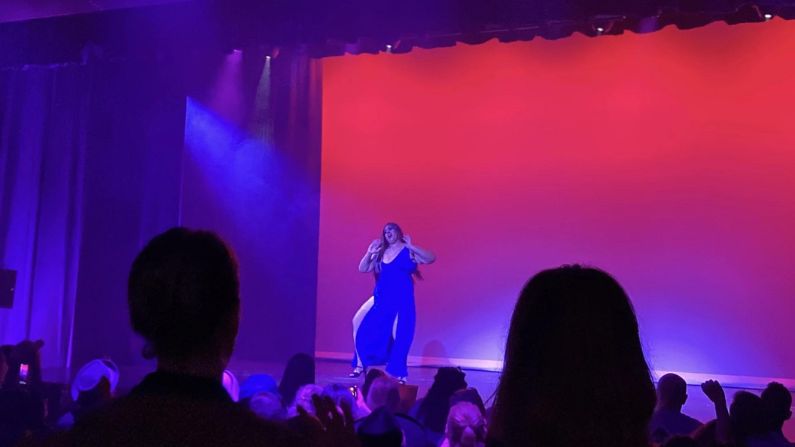Neon lights pulse over the stage at The Arts Campus at Willits (TACAW) in Basalt, Colorado, and Ramona Chingona appears onstage, wearing a floor-length blue dress and tall black stilettos.
Ramona is the drag persona of Bryan Alvarez-Terrazas, a longtime Roaring Fork Valley local.
“Growing up queer and Latino, of Mexican culture and heritage, being queer was not an identity that I would easily embrace or that I would easily claim,” Alvarez-Terrazas said.
Alvarez-Terrazas was born in Glenwood Springs and had a tough time in a family that didn’t always accept his queer identity.
“And I kind of hit this breaking point where I was like, ‘You know what? I’m tired of feeling like I’m not enough, like my identity is something that I should be ashamed of,’” Alvarez-Terrazas said. “And so from there, I got the idea of having the first drag troupe in the valley and having shows locally here with local drag queens.”
Alvarez-Terrazas is one of the founding members of The Roaring Divas, composed of four drag queens who perform in the Roaring Fork Valley. This was their second event at TACAW this year, and these divas aren’t just performers. Over the weekend, the group danced, lip-synced and educated the audience in honor of Hispanic Heritage Month. The event was called “Latine Pride.”
“Latine” is a gender-inclusive term for people of Latin American descent, but many may be more familiar with the term “Latinx.” It’s unclear exactly where and when Latinx was coined, but it has gained a lot of recognition over the past decade.
One of the other drag queens, Zen Fatale, prefers to go by her drag name for this story. She says the terms represent the same thing, but Latine has deeper roots in the Castilian or Castellano dialect of Spanish that originates from central Spain.
“Spanish has always had neutral terms,” Fatale said. “People always say we gender things: Latina, Latino. But there’s Latine right in the middle, and there’s always been that.”
She says one can add the “e” suffix—written without an accent but pronounced “ay”—to the end of many gendered words in the Spanish language to neutralize it.
“Instead of like nosotros or nosotras, it could be nosotres,” Fatale said. “So if you add an ‘e’ to pretty much anything, it becomes gender neutral.”
Some Spanish interpreters say they’re seeing this grammar tool used more often, particularly in young and LGBTQ+ populations. Alvarez-Terrazas said that, for him, choosing the term Latine also has to do with flow.
“It doesn’t sound as much like a hard stop as the ‘x’ does,” Alvarez-Terrazas said. “And so I think that that was part of the appeal for myself, at least—it still sort of names folks that are nonbinary, such as myself within the Latino and Latina community.”
Fatale said Latine addresses some criticisms she has heard about the term Latinx.
“Because what I found is there’s a lot of pushback to Latinx,” Fatale said. “There’s a lot of people that say, ‘Oh, why are we inventing new things?’ Whether it’s older generations or people that want to get into linguistics, they cannot fight Latine. They can argue against Latinx. They can say stop making up terms, but they can’t fight Latine because that has always existed. That has existed as long as Latina and Latino.”
Latine doesn’t replace Latinx, but it is another option.
Fatale also took time to talk about this term onstage; in a conversation after the event, Alvarez-Terrazas said he prefers Latine, but he added that it’s really a personal decision.
“Ultimately, it comes down to the person of how you identify yourself and what term you think best summarizes you and that you identify with,” Alvarez-Terrazas said.
Linguistics was somewhat of a theme for this particular event, and Alvarez-Terrazas says he hopes all of The Roaring Divas’ events can be educational.
“Drag has forced my family and I to have different conversations, and … especially for older generations, to really rethink what gender expectations are, what gender roles are, how someone can dress, how somebody should talk, how somebody should look, and so it really pushes us to think outside of what the norm is,” Alvarez-Terrazas said.
That story from Aspen Public Radio was shared with us via Rocky Mountain Community Radio, a network of public media stations in Colorado, Wyoming, Utah and New Mexico. including KHOL.






